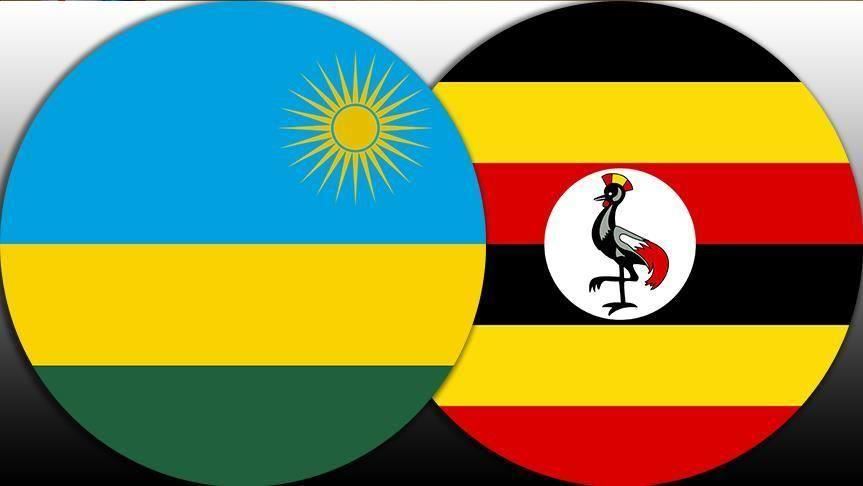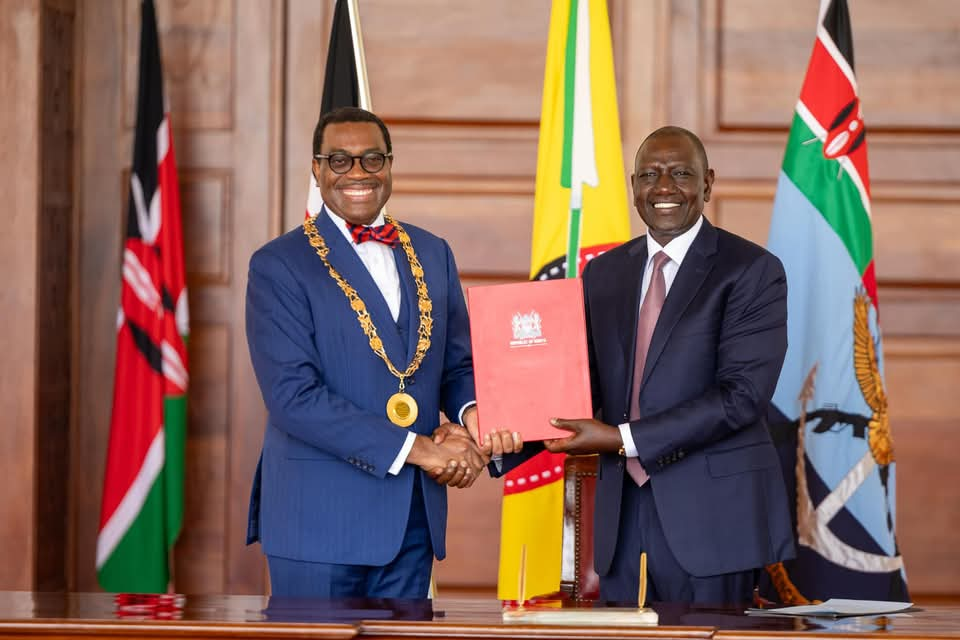By Eric Elezuo
“I am very proud to be the President that confers on you this well-deserved honor of the people of Kenya”
One of Nigeria’s finest exports, who is the President of the prestigious African Development Bank (AfDB), Dr. Akinwumi Adesina, has once again, raised the bars in honours and awards acquisition.
The seasoned diplomat, who once served as Nigeria’s Minister of Agriculture and Rural Development, was on Monday, March 17, 2025, conferred with the highest-rated honour in Kenya, the Chief of the Golden Heart (C.G.H) at the State House, Nairobi.

President William Ruto of Kenya, who joyfully did the honours, noted that the award was for his role in the East African country’s Last Mile Connectivity and Lake Turkana Wind Projects among other landmark achievements across Africa.
For starters, the C.G.H. is the highest award in Kenya and is mostly given to sitting heads of state or exceptional global leaders. This signifies that Adesina, for his global glories, developmental strides, efforts at uniting Africans through via economic options, equate in status with a sitting president of Kenya. The award was some days earlier also given to His Highness Prince Rahim Al-Hussaini Aga Khan V.


Speaking elatedly after giving the award to Adesina, with all the accompanying paraphernalia, President Ruto hailed the AfDB President, saying he deserves the honour for his commitment and distinguished service to the people of Kenya.
He noted: “I am very proud to be the President that confers on you this well-deserved honor of the people of Kenya. It is an honor that I have the privilege as President but on behalf of the government and the people of Kenya to award you for the distinguished service, the commitment you have demonstrated, and the passion you have worked with to see to it that in every way even before you became the President of the African Development Bank.”


Responding, Adesina, who was flanked by his beloved wife, many other aides, colleagues and associates including the Chairman, Ovation Media Group, Chief Dele Momodu, thanked President Ruto for honoring him with the prestigious award saying it is a rare privilege to be conferred with the award.
“Your Excellency President Ruto I am most grateful to you for conferring me today with the prestigious honor of the Chief of Order of the Golden Heart (C.G.H), Kenya’s highest and most distinguished honor.


“I am very humbled for your incredible kindness what a great honor, what a rare privilege, what a historic recognition. The country that I love so much, Kenya, loves me back, appreciates and celebrates my leadership at the African Develpment Bank. Thank you, Mr. President,” said the AfDB President.
He added, “On behalf of my dear wife and your sister, Grace, the Board of Directors at the African Development Bank, our boards of governance, the management and staff of the African Development Bank and on my own behalf, I accept this honour with great humilty.”


A statement shared on their verified X handle after the award, the Kenyan State House noted in part that, “President William Ruto has thanked the African Development Bank (AfDB) for working with Kenya to drive critical areas of the country’s growth in the past 60 years.
“The President made the remarks when he conferred AfDB President and Chairman of the Board Akinwumi Adesina with the Chief of the Order of Golden Heart (CGH) award in Monday at State House, Nairobi.”


“It is an honour that I have the privilege as President, and on behalf of the people of Kenya, to award you for the distinguished service, commitment, and passion you have demonstrated for our country,” Ruto was qouted as saying.
Akinwumi was elected President of Africa Development Bank in 2015, and has remained in office till date.
The AfDB President’s speech is produced in full next page…

 News7 years ago
News7 years ago
 Featured7 years ago
Featured7 years ago
 Boss Picks7 years ago
Boss Picks7 years ago
 Headline7 years ago
Headline7 years ago
 Headline6 years ago
Headline6 years ago
 Headline6 years ago
Headline6 years ago
 Headline7 years ago
Headline7 years ago
 Headline6 years ago
Headline6 years ago


























